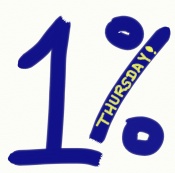1% Thursday: Caffeine Levels
Many doctors will tell you to cut the caffeine when looking for migraine triggers. But did you know some doctors see things a little differently?
I’m not suggesting you ignore your doctor – cutting caffeine is a great thing to try. But there’s something else you might want to try – that is, levelling your caffeine intake. Taking about the same amount each day, around the same time.
Spikes and drops in your caffeine levels may be even more of a migraine trigger than the caffeine itself. Suddenly drinking 12 cups of coffee one night, then nothing the next day – ouch. Or even sleeping in on Saturday and missing your regular morning coffee – that can be a trigger too.
Try having about the same amount each day – but keep that amount low. Lower it gradually. Watch for caffeine in colas, and even in medication. Try to keep it level as much as possible, and see what kind of difference it makes. This alone may cut some of those attacks you’ve been getting.
Read more about the headache caffeine connection here.
What is 1% Thursday?
 |
Every Thursday at Headache and Migraine News (weather permitting) we’ll talk about one measurable, practical thing we can do to make our lives just 1% better. Usually it will be something very easy, sometimes it will be a challenge. Let us know if you try it, or share an idea of your own – and maybe a year from now we’ll see that things have really changed for the better!

14 May 2011 @ 2:39 am
I was told by my neurologist that the three cups of coffee a day that I was consuming was fine. I did tell her I try to have decaffeinated coffee as much as a I can, but she told me that decaf still has (depending on the coffee) approximately 40-60% caffeine in it. She told me to enjoy the real thing (caffeinated) but to limit myself to the three cups a day.
14 May 2011 @ 7:18 am
Actually, Toni, if you change back and forth from decaf to regular, that could cause more problems than just staying on regular all the time.
40-60%? Well, it probably depends on the brand and the coffee. By law in the USA, for example, decaf must have 97.5% of the caffeine removed. From what I’ve seen, most often the levels range from 1%-15%. The strongest decaf and the weakest instant might get you up to 45%, but that would be rare.
But that brings up another interesting point – there is a range. Even drinking non-decaf, you could easily get double the caffeine in one cup of regular compared to another!
So maybe the answer is – stick to the same brand?
Personally, I still think aiming for lower amounts will be the most help in the long run.
15 May 2011 @ 7:49 am
James, thank you for your reply. Switching from decaf to regular was exactly what I was doing. I am now only drinking regular coffee to a maximum of three cups a day. I try to consume it at the same time each day – breakfast, break and evening (aiming for approximately the same time). I only drink Tim Horton’s coffee (at work) and Folgers (at home).
Perhaps you can help me with the treatment she started me on. I have many allergies, one being aspirin. She told me not to take Tylenol (which is what I was using). Apparently, if I take more than two a week then I will get a rebound headache. She told me to buy vitamin B2, magnesium citrate and Butterbur. Have you heard of this combination for migraines? I’m a little reluctant to use the Butterbur as I have read it can cause an allergy reaction in people who are allergic to ragweed. Thanks for your help.
21 June 2011 @ 8:51 pm
Toni,
I don’t want to specifically give you advice, you understand, but I can tell you that B2, magnesium and butterbur is a very common and well researched combination. Tell your doctor about your allergy and make sure you’re under her supervision.
19 February 2015 @ 9:41 am
I have been using essential oils for my headaches / migraines. I layer on peppermint, lavender and frankincense putting them on the back of my neck, temples an forehead. I don’t get debilitating migraines but they are pretty awful at times. I have found that if I use Tylenol and Advil on a daily basis for my headaches then I actually get more headaches more frequently. The oils work about 85-90% of the time to give me significant relief from the pain. If the headaches are super awful then I will take Advil or Tylenol along with using the oils but only after trying the oils first. It has changed the way I treat my headaches. Please look for high grade oils and not the brands you can get at the natural food stores. They are not pure. I use DoTerra oils and I have friends who use young living essential oils. I hope this information is helpful.